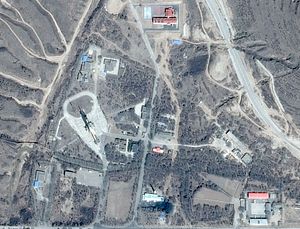On Wednesday, the Chinese People’s Liberation Army Rocket Force (PLARF) carried out a flight test of a Dong Feng 4 (DF-4; known by the United States as the CSS-3) intercontinental-range ballistic missile, a U.S. government source with knowledge of China’s strategic weapons programs told The Diplomat.
The test was carried out from the Taiyuan Satellite Launch Center, a common satellite and ballistic missile launch site, which is also known by the U.S. intelligence community as the Wuzhai Missile and Space Test Centre. The site is in China’s Shanxi province.
The test of a DF-4 is notable since the missile is China’s oldest intercontinental-range system, with an estimated range of 5,500 to 7,000 kilometers — insufficient to strike targets in the continental United States apart from Alaska. The missile is a two-stage, liquid propellant missile that was first deployed in the mid-1970s. Today, few DF-4s are thought to be deployed, with the PLARF primarily relying on the DF-5 for intercontinental-range targeting.
It’s unclear if Wednesday’s launch featured a DF-4 based in a silo or in the more usual rollout launch configuration, where the missile would exit a hardened basing site before being erected, fueled, and launched.
Given that the DF-4 is no longer a primary component of the PLARF’s targeting, it’s also unclear what specific purpose Wednesday’s test was intended to serve. China has conducted multiple ballistic missile launches recently, but has mostly focused on its newer intermediate-range ballistic missiles, solid fuel missiles, and long-range ground-launched cruise missiles.
Wednesday’s test does suggest that China continues to rely on the DF-4 for certain targeting scenarios. While the missiles are aging and few are thought to remain operational, the DF-4 could serve as an important strike platform against targets in India, for example. (The PLARF’s newer, more advanced systems are likely assigned to U.S. targets.)
If there was a signaling motive behind Wednesday’s flight test, it could have been meant for India. For more than two months now, Chinese and Indian troops have been locked in a tense standoff over a piece of territory disputed between Bhutan and China in the Himalayas. Over these months, Chinese rhetoric has grown increasingly strident, with state-run media threatening conflict.
While the prospect of escalation does not appear to be imminent, a DF-4 launch would serve as a reminder of the nuclear stakes that will loom over any future India-China conflict.

































